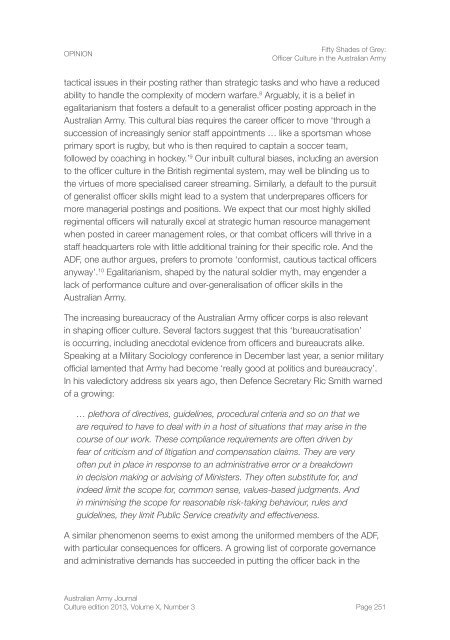Australian Army Journal
Australian Army Journal
Australian Army Journal
You also want an ePaper? Increase the reach of your titles
YUMPU automatically turns print PDFs into web optimized ePapers that Google loves.
OPINION<br />
Fifty Shades of Grey:<br />
Officer Culture in the <strong>Australian</strong> <strong>Army</strong><br />
tactical issues in their posting rather than strategic tasks and who have a reduced<br />
ability to handle the complexity of modern warfare. 8 Arguably, it is a belief in<br />
egalitarianism that fosters a default to a generalist officer posting approach in the<br />
<strong>Australian</strong> <strong>Army</strong>. This cultural bias requires the career officer to move ‘through a<br />
succession of increasingly senior staff appointments … like a sportsman whose<br />
primary sport is rugby, but who is then required to captain a soccer team,<br />
followed by coaching in hockey.’ 9 Our inbuilt cultural biases, including an aversion<br />
to the officer culture in the British regimental system, may well be blinding us to<br />
the virtues of more specialised career streaming. Similarly, a default to the pursuit<br />
of generalist officer skills might lead to a system that underprepares officers for<br />
more managerial postings and positions. We expect that our most highly skilled<br />
regimental officers will naturally excel at strategic human resource management<br />
when posted in career management roles, or that combat officers will thrive in a<br />
staff headquarters role with little additional training for their specific role. And the<br />
ADF, one author argues, prefers to promote ‘conformist, cautious tactical officers<br />
anyway’. 10 Egalitarianism, shaped by the natural soldier myth, may engender a<br />
lack of performance culture and over-generalisation of officer skills in the<br />
<strong>Australian</strong> <strong>Army</strong>.<br />
The increasing bureaucracy of the <strong>Australian</strong> <strong>Army</strong> officer corps is also relevant<br />
in shaping officer culture. Several factors suggest that this ‘bureaucratisation’<br />
is occurring, including anecdotal evidence from officers and bureaucrats alike.<br />
Speaking at a Military Sociology conference in December last year, a senior military<br />
official lamented that <strong>Army</strong> had become ‘really good at politics and bureaucracy’.<br />
In his valedictory address six years ago, then Defence Secretary Ric Smith warned<br />
of a growing:<br />
… plethora of directives, guidelines, procedural criteria and so on that we<br />
are required to have to deal with in a host of situations that may arise in the<br />
course of our work. These compliance requirements are often driven by<br />
fear of criticism and of litigation and compensation claims. They are very<br />
often put in place in response to an administrative error or a breakdown<br />
in decision making or advising of Ministers. They often substitute for, and<br />
indeed limit the scope for, common sense, values-based judgments. And<br />
in minimising the scope for reasonable risk-taking behaviour, rules and<br />
guidelines, they limit Public Service creativity and effectiveness.<br />
A similar phenomenon seems to exist among the uniformed members of the ADF,<br />
with particular consequences for officers. A growing list of corporate governance<br />
and administrative demands has succeeded in putting the officer back in the<br />
<strong>Australian</strong> <strong>Army</strong> <strong>Journal</strong><br />
Culture edition 2013, Volume X, Number 3 Page 251

















